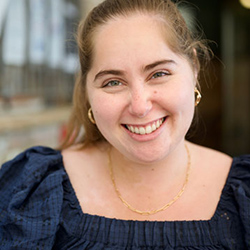Leah Marcus is a teacher who graduated from Vanderbilt University last year with a graduate degree in Education Policy, specifically focused on elementary education. One aspect of Leah’s life that has profoundly influenced her educational and career paths is her dyslexia.
Leah is dyslexic, a learning disability that affects reading ability due to differences in the brain, which is often genetic. Her passion for supporting students with dyslexia led her to volunteer with Learning Matters Inc, a 501(c)(3) nonprofit organization that provides resources for students with dyslexia at income-based prices to reduce barriers of receiving educational support. Learning Matters provides services such as tutoring, dyslexia assessments, and advocacy such as accompanying parents to school meetings. Leah also creates content on social media about dyslexia, sharing the knowledge she’s gained from Learning Matters, while also bringing in her personal experience as a teacher with dyslexia.
“My teachers at my school changed my life. Learning Matters is doing that same work. I watch them change lives every single day, so that another child can have an opportunity that their peers already have.”
In her work with Learning Matters, Leah has encountered many parents who are themselves dyslexic but unaware. In fact, 1 in 5 people are dyslexic according to the Yale Dyslexia Center. Dyslexia is a significant factor in a person’s literacy and has been linked to higher rates of welfare and incarceration. Leah is motivated by the knowledge that literacy can change lives and that organizations like Learning Matters can make a significant impact on a child’s educational opportunities and overall life success.
Leah has even witnessed the impact of her work on the people in her own life. One of Leah’s friends, who teaches at an under-resourced school, shared that four of her students had recently been diagnosed with dyslexia and how she as a teacher felt unprepared to support them. Leah was able to connect her friend with the right resources, such as tutoring services and resources to learn strategies for supporting students with dyslexia.
In the process of volunteering, not only was Leah able to help others, she was also able to learn more about herself and her own dyslexia. Through Learning Matters, she found a community of like-minded individuals who are as passionate as she is about dyslexia advocacy. “To have a community to talk with about a niche issue that can be stigmatized is really empowering”, she says.
Leah encourages people who think their child has dyslexia to request a psychoeducational evaluation from the school or pediatrician. She also recommends visiting Understood.org, a website that has a variety of resources, including fact sheets that help identify signs and symptoms of dyslexia and strategies for navigating parent-teacher conferences. Local chapters of the International dyslexia Association can also offer resources, lists of professionals such as tutors, diagnoses, and assessment.
“If your student is not learning how to read, that is not necessarily your fault. Getting more books doesn’t create a better reader, in the same way that giving a child more soccer balls does not create a stellar soccer player. Sometimes it’s about what is happening in their brain”
Leah’s advice for those who want to make a difference in the world is to find what they are passionate about and go deep into that particular area. It is easy to be overwhelmed by how much work there is to do, but choosing to focus on one issue that is the most meaningful to you can have the most significant impact.

